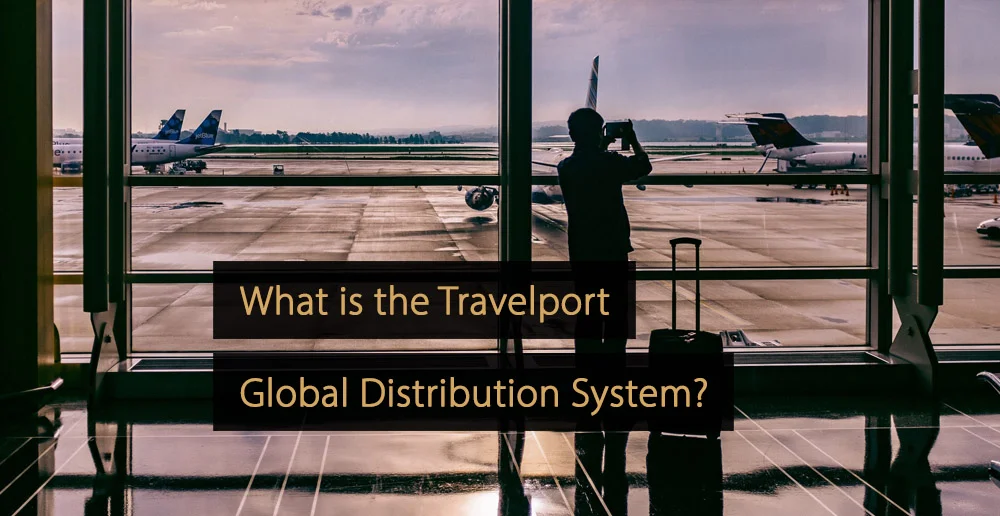A global distribution system (GDS) is one of the key distribution channels for hotel owners, allowing travel agencies to access live information related to inventories and pricing, to sell hotel rooms to their customers. In this article, you will learn more about the Travelport GDS and how it can benefit those in the travel industry.
What is a GDS System?
A GDS system, or global distribution system, is the name given to a network that enables transactions between travel industry service providers. Travel agencies mainly use these systems to access inventories in real-time and sell travel products to their customers, on behalf of providers.
The products or services booked through a GDS system can include airline tickets, car rentals, and hotel rooms. For those in the hotel industry, a GDS system is an important distribution channel, as it connects them with travel agents worldwide, potentially increasing demand, room bookings, and revenue. You can read more detailed information about global distribution systems and the benefits for hotels in the article “Global Distribution System (GDS): What Are the Benefits for Hotels?”.
What is the Travelport GDS?
The Travelport GDS is regarded as one of the three major global distribution system operators. The company has its headquarters in the United Kingdom, but can trace its history back to 1971, and the creation of the Apollo GDS in the United States. Indeed, today, Travelport is comprised of the Apollo, Worldspan, and Galileo GDS systems.
While Travelport GDS was initially geared towards airline companies, it is today used to distribute various products and services for those in the travel industry, including hotel rooms and hotel products.
What Are the Benefits of Travelport GDS?
One of the major benefits of Travelport GDS is the ability for hotel owners and others within the travel industry to distribute their products to travel agencies worldwide. Indeed, this global distribution is especially relevant with Travelport, because it is less reliant on its home market than its two main rivals.
While the Amadeus GDS is especially strong in Europe, and Sabre is strong with the North American market, Travelport’s strength is more evenly distributed across the continents. This is advantageous, as it provides access to some of the strongest travel markets in the world, including North America, Europe, and Asia.
Similar GDS Systems to Travelport GDS
The Travelport GDS is one of the three main global distribution systems available to hotels, travel agencies, airlines, and others within the travel industry. The two main alternatives are as follows:
1) Sabre
The Sabre global distribution system is based in the United States and has a history dating back to the early 1960s. It serves somewhere in the region of 60,000 travel agencies globally, while its location makes it particularly attractive as a gateway to the lucrative North American market.
Notably, the percentage of Sabre bookings related to hotel rooms, or hotel-related services, is believed to be greater than with its rivals. In total, Sabre has a market share of around 35 percent. You can read more detailed information about the Sabre GDS system in the article “What is Sabre GDS?”.
2) Amadeus
Amadeus is the largest global distribution system by market share, accounting for around 40 percent of travel agency bookings. It was established in 1987 and connects travel agents to hotel rooms, airline tickets, and other travel services, although most Amadeus bookings are flight-related.
The company headquarters is in Spain, while the central database is in Germany. As a result, it may appeal to hotel owners who are particularly focused on the European market, where it is by far the strongest GDS. You can read more detailed information about the Amadeus GDS system in the article “What is Amadeus GDS?”.
How to Connect Your Hotel to Travelport GDS?
Most hotels connect to the Travelport GDS by going through a GDS provider. Various companies offer this kind of service, and the benefit is that they will connect a hotel to all major GDS systems simultaneously.
Hotels can then manage their listings, including a property description, photos, and facility information, and can distribute their inventory and pricing, all from a single place. GDS providers usually have connections with property management systems (PMS) and hotel channel managers, allowing GDS system usage to be fully automated.
Travelport GDS is one of the ‘big three’ GDS systems used by businesses in the travel industry, including hotels, to distribute inventories to travel agents. Connecting a hotel to a global distribution system can increase demand for hotel rooms, resulting in more bookings and more revenue.
More Distribution Tips to Optimize Revenue
The distribution mix that hotels choose to use significantly impacts their revenue management strategy and overall success. In the following articles, you can find more distribution strategies to optimize your revenue:
- List of Online Travel Agents (OTAs) to Increase Your Hotel Bookings
- List of Corporate Travel Agents for Hotels to Gain More Business Travellers
- The Most Important Online Distribution Channels for Hotels
- Tips To Gain More Bookings With Your Hotel Website
- Essential Hotel Marketing Strategies
More Tips to Grow Your Business
Revfine.com is the leading knowledge platform for the hospitality and travel industry. Professionals use our insights, strategies, and actionable tips to get inspired, optimize revenue, innovate processes, and improve customer experience.Explore expert advice on management, marketing, revenue management, operations, software, and technology in our dedicated Hotel, Hospitality, and Travel & Tourism categories.
This article is written by:
Hi, I am Martijn Barten, founder of Revfine.com. With 20 years of experience in the hospitality industry, I specialize in optimizing revenue by combining revenue management with marketing strategies. I have successfully developed, implemented, and managed revenue management and marketing strategies for individual properties and multi-property portfolios.









Leave A Comment